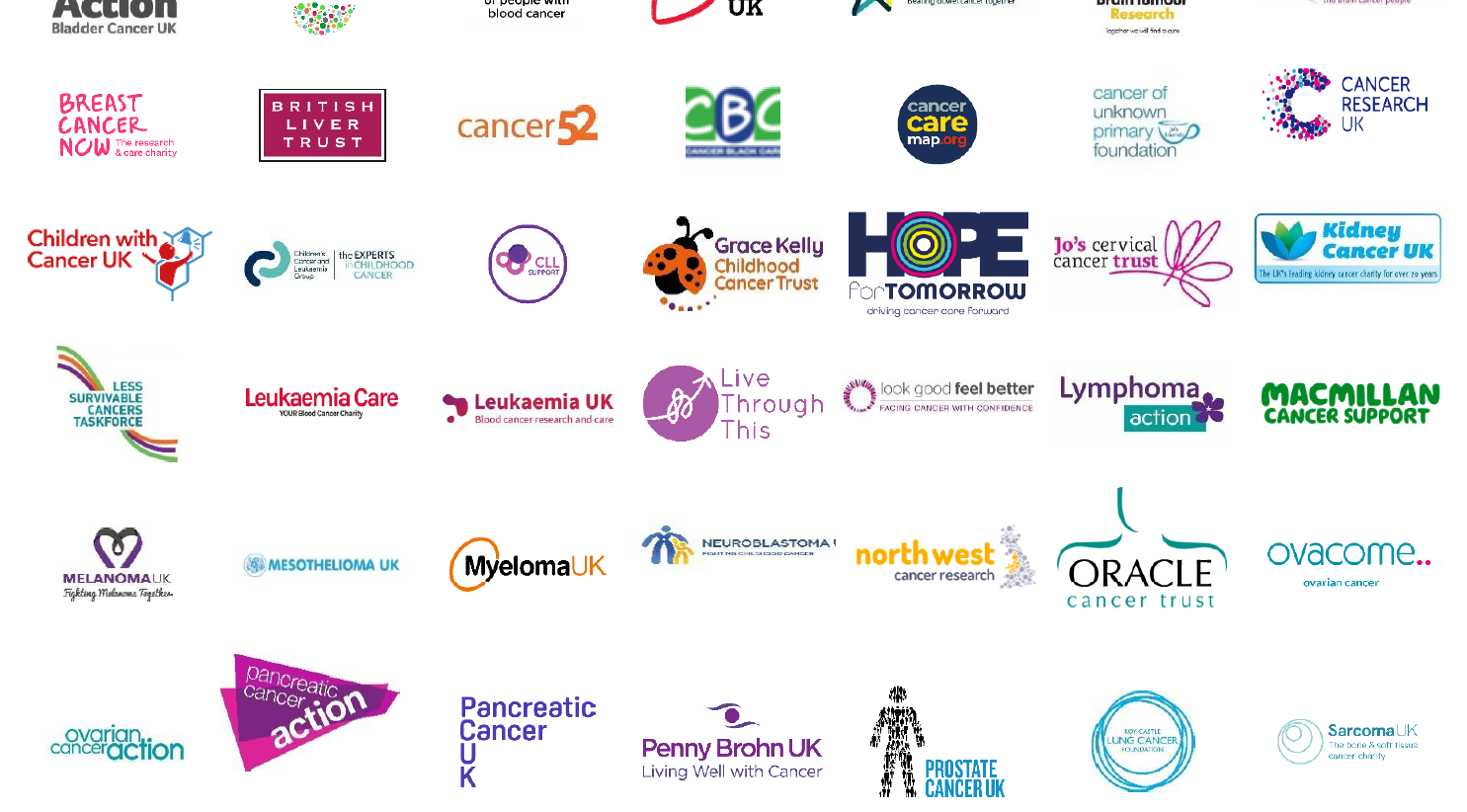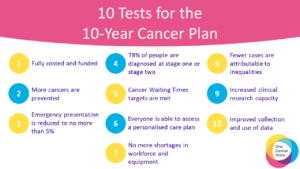
30 Mar 2022 Policy
One Cancer Voice 10-Year Cancer Plan Consensus Statement
Today, as one of 54 cancer charities, we speak with One Cancer Voice and publish 10 tests that the Government’s new 10-year Cancer Plan must meet if it is to be successful.
Drawing on our collective experiences from supporting people living with cancer, research, data and insight, we have developed this consensus statement, setting out what actions Government and the NHS need to take to ensure people diagnosed with cancer in England get the very best care and treatment.
If the new 10-year Cancer Plan is to be successful in delivering world leading and transformative change then we believe it must meet the following 10 tests:
1. The 10-year Cancer Plan has clear political leadership, is fully costed and funded throughout its lifetime, with an annual report published on progress made against its ambitions.
2. More cancers are prevented and England is ‘smoke free’ by 2030
3. The public is aware of the risk factors, signs and symptoms of cancer and act on them, leading to improvements in presentation. Emergency presentation is reduced to no more than 5%.
4. Progress towards early diagnosis is accelerated so that 78% of people are diagnosed at stage one or stage two and a 95% Faster Diagnosis Standard is met.
5. Every person with cancer can access the treatment they need, at the right time, for the best outcomes. Cancer Waiting Time targets are met in every part of the country.
6. By 2032, everyone with cancer is able to access a needs assessment and personalised care plan to support their health and wider wellbeing needs.
7. Workforce and equipment shortages are addressed so that every person with cancer has access to the specialist workforce they need when they need it.
8. Cases of cancer attributable to inequalities have meaningfully decreased.
9. Clinical research capacity is increased, health service staff have access to dedicated research time and training and all populations are given the opportunity to participate in clinical trials.
10. Data collection is timely, accessible, standardised and comprehensive and it is analysed and published swiftly to support the delivery and monitoring of all aspects of cancer across the pathway and cancer research.

There are around 313,000 new cancer cases in England every year, that’s around 858 people diagnosed every day (1). Cancer remains one of England’s biggest killers with 137,234 people dying of cancer in 2020 (2). This has increased by 8% since 2001 and will continue to increase as more people are diagnosed with the disease each year. (3)
This new Cancer Plan must be ambitious in scope to recover from the pandemic and to close the gap between England and the best performing countries in the world. The pandemic has affected cancer care, with an estimated 33,000 people missing from the system. Our survival continues to lag behind the best performing countries in the world. There is an urgent need to level up by focusing on inequalities across the cancer pathway so that everyone gets the very best cancer care.
1. Cancer Research UK – Cancer Incidence by sex and UK country
Related posts
18 May 2022
World Blood Cancer Day interview with Dr Pramila Krishnamurthy
On 28th May the global blood cancer community comes together to mark World Blood Cancer Day, this campaign calls for support of those with blood cancer and encourages people to become stem cell donors.
17 October 2022
New campaign launches for the forgotten 500,000 families
Patient groups, charities and clinicians unite to raise awareness of half a million vulnerable people, many of whose lives have never returned to normal after the Covid-19 lockdown. A new…
7 November 2022
Leukaemia UK appoints Ian McCafferty CBE as their new Chair of Trustees to support new strategy to stop leukaemia devastating lives
Ian McCafferty CBE will take up the role in January 2023, from current Chair of Trustees, Chris Corbin OBE, and will lead the charity as it continues to grow. Chris…
19 September 2023
“Fundraising never tasted so good!”: Star-studded evening raises over £235,000 for life-saving leukaemia research
Chefs and celebrities mingled at The Dorchester last night for a gastronomic spectacular in aid of Leukaemia UK, raising over £235,000 to support world-class research into the devastating disease. Who’s…